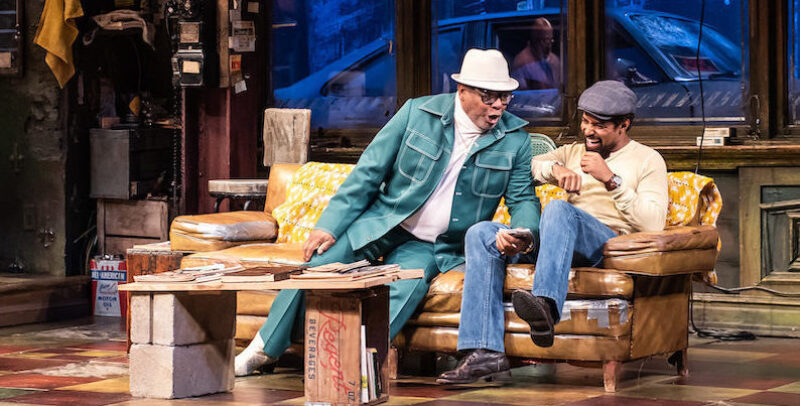Jitney: How Small Victories Against Oppression Bring Large Change
Review of August Wilson's Jitney at Seattle Rep
Written by TeenTix Newsroom Writer Jaiden Borowski and edited by Teen Editor Anya Shukla

Warning: Spoilers ahead!
By creating a full world of its own from simple interactions, August Wilson’s Jitney artfully depicts the everyday interactions between employees of a jitney business during the 1970s. (To provide some context, jitney businesses offered unlicensed taxis for the black community when typical services would not due to racial discrimination.) Jitney displays the everyday hustle and bustle of working-class Americans, allowing the audience to create relationships with and appreciate the details and flaws of each of its characters.
The play gives breath to every role, infusing the jitney’s breakroom with a variety of personalities. The characters themselves maintain an energy about them—albeit one set to a reduced pace—which authentically demonstrates the characters’ realism in the face of racial oppression. This methodically reinforces the play’s main point: the importance of real people making small, positive changes.
From the first scene, an attention to detail is noticeable in every aspect of the performance. The initial jazz music filtering through the room accompanies a stage devoid of people, yet with much to entertain the eye. Two walls form a triangle on the stage, and it is through this room that the community of the jitney business is presented. These walls teem with evidence of life, ranging from time-worn wallpaper to faded signs displaying the rates for a specific drive.
Furthermore, two giant windows connect the small room to the entire neighborhood that it serves. The scenes seen through those windows, such as a potential fight or a new character, build suspense. Old cars also sit outside, showing the jitney business’ mode of transportation while still enclosing the main action to the single room. The combination of the dim, crowded stage and the slow jazz set the tone for the following events.
Each character’s life is constructed through a variety of means: some details are revealed through a shaky hand and a gun; others float via the cloudy recollection of a dream. Becker (Steven Anthony Jones), the owner of the jitney business, is the caretaker and holds the team together with a caring but ultimately firm hand. His main goal is not only to keep the jitney business running, but to provide a valuable service to his community by making his jitney service the best it can be. While Becker does eventually rally his workers together, he doesn’t always have complete control of the group…especially when Turnbo (Ray Anthony Thomas) gets out of hand. Turnbo, an older employee, is the town gossip who gets himself into trouble by getting into everyone else’s business. Specifically, tensions rise when Turnbo questions Youngblood’s (Amari Cheatom) motives. Youngblood, the youngest employee, is trying to hold together his family but isn’t quick to talk about how he does so, perhaps because his plans challenge racial and class divides. Additional characters add depth to the complex pecking order of this jitney.
All of the characters brought a new and important viewpoint to the stage, and there seemed to be a conscious choice to leave the title of “Main Character” up for grabs. The play begins with one character, ends with another, and splits a majority of its time between three. This lack of a clear main character places the focus of the play not on the actions of one person, but on the jitney team’s collaborative efforts.
While there are skirmishes and grudges (which eventually develop into full-blown fights) between the employees at this jitney business, the central opposition doesn’t come from one another, but from a larger governing body: the city. When the city decides to shut down the jitney, the workers ultimately decide, with prompting from Becker, to fight this decision through the courts instead of going out of business. I was prepared to witness an important moment in the history of jitney business. Perhaps partially due to my anticipation, I was (*spoiler alert*) completely shocked when the plot took a severe turn for the worse.
When the group’s resolution to fight against the city came to a screeching halt, I was left unsatisfied. All of the characters’ efforts—as well as the audience’s emotional investment into the drama—was wasted.
However, even with the future uncertain for these characters, I felt a thin sense of hope as the ending of the play provided some meaning. Although for the characters, the fight for political equality ended before it could truly begin, the play doesn’t showcase the jitney team as failures, but as futures of change. This ending of possibility transformed these characters from unsuccessful civil-rights activists to heroes in their own right. By making these characters successful through the small victory of simply staying open day-by-day and providing a much-needed service for their community, instead of placing their happiness on a singular battle, this play showed the unsung story of the people who fought for change outside of the public eye.
By keeping their jitney open, these characters did not accept the racial prejudice at the time. As taxis (and many other services) ignored the black community due to the racist norms in place during this time period, the jitney’s services gave members of the black community a chance to thrive in a society set up to make them fail. While the members of this jitney weren’t recognized for the societal boundaries they pushed by keeping their business running, they gave hope to many people in their community. And that, to them, was enough.
August Wilson's Jitney ran at Seattle Rep February 28 - March 29, 2020. For event information see here.
Lead photo caption: Harvy Blanks and Amari Cheatom in August Wilson's Jitney at Seattle Rep. Photo by Nate Watters.
The TeenTix Newsroom is a group of teen writers led by the Teen Editorial Staff. For each review, Newsroom writers work individually with a teen editor to polish their writing for publication. The Teen Editorial Staff is made up of 6 teens who curate the review portion of the TeenTix blog. More information about the Teen Editorial Staff can be found HERE.
The TeenTix Press Corps promotes critical thinking, communication, and information literacy through criticism and journalism practice for teens. For more information about the Press Corps program see HERE.


